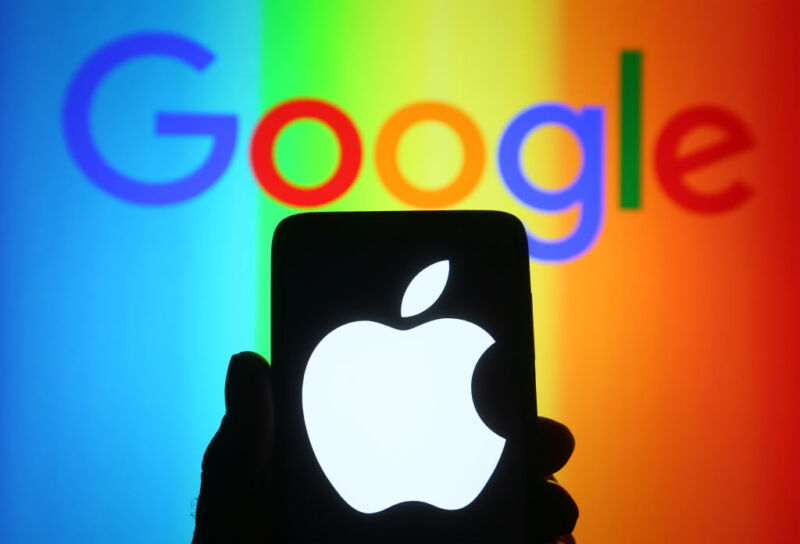
Google’s default search deal with Apple is worth so much to the search giant that Google pays 36 percent of its search advertising revenue from Safari to keep its search engine set as the default in Apple’s browser, Bloomberg reported.
Google and Apple objected to making this key detail public from their long-running default search deal. But their closely held secret came out on Monday during testimony from Google’s main economics expert, Kevin Murphy, during the Department of Justice’s monopoly trial examining Google’s search business.
“Probably the biggest slip of the entire trial,” Big Tech on Trial, an account dedicated to providing updates from the Google trial, posted on X (formerly Twitter).
According to Bloomberg Law, Google attorney John Schmidtlein “visibly cringed” when Murphy revealed the confidential information, which Google had initially claimed needed to be kept secret because otherwise it “would unreasonably undermine Google’s competitive standing in relation to both competitors and other counterparties.”
For the DOJ—which has made the Google-Apple deal the center of its case alleging that Google maintains an illegal monopoly over search—this detail confirms how valuable default placements on iPhones are to the search leader.
The DOJ has argued that Google pays so much for default search deals to block out competitors, lock search users into its services, and maintain a stronghold over the search industry—a dominant position that could be further entrenched by Google’s advances with AI, Microsoft CEO Satya Nadella testified. In September, an Apple exec testified that the default deal between Google and Apple was seemingly so lucrative that it even stopped Apple from creating its own rival search engine.
It’s still unclear exactly how much money that portion of Google’s search advertising revenue that comes from Safari amounts to, but several estimates have been floated. Statista reported that Google’s advertising revenue was $224 billion in 2022, and based on that, Engadget estimated that Apple likely gets paid in the tens of billions of dollars for Google’s default Safari placements.
Previously, sources told The New York Times that Google paid Apple approximately $18 billion in 2021 for the deal, but the exact amount of revenue sharing remained unknown until Monday. The DOJ’s trial also recently revealed that Google paid $26 billion in total for default contracts, which are ostensibly responsible for driving up its search advertising revenue that is right now rapidly climbing. Google’s global ad revenue will likely reach nearly $340 billion by 2027, Statista reported, driven largely by Google’s search engine traffic, which is currently responsible for “roughly 38 percent” of its global ad revenue.
In total, across all those default deals, Digital Content Next CEO Jason Kint estimated in a post on X that it’s possible that Google derives “at least $90 billion of its current annual revenue.”
Last month, Google CEO Sundar Pichai testified that default deals “can make a difference” and can be “very valuable” if “done correctly” but maintained Google’s chief defense that partners like Apple enter these deals with Google because Google has a superior search engine.
If the DOJ proves that these default deals ensure that Google maintains an illegal monopoly in general search markets, Google could be ordered to break up its search business, shifting not just Google’s bottom line but also its partners, like Apple.
While the trial resumes for another week, Google continues profiting off the deals. From 2022 to 2023, Google’s ad revenue increased by $5 billion, Search Engine Land reported, and seemingly as Nadella predicted, Pichai attributed these gains to AI-driven innovations across Google products, including search.
“We’re continuing to focus on making AI more helpful for everyone; there’s exciting progress and lots more to come,” Pichai said in a statement reported by Search Engine Land.
Judge Amit Mehta, presiding over the antitrust trial, has said that the Google-Apple default deal is the “heart” of the DOJ’s case against Google. With each new detail revealed about how much Google is willing to pay Apple to maintain their deal, the DOJ hopes to convince Mehta that the deal gives Google an unfair advantage over competitors. This week’s slip-up from one of Google’s witnesses threatens to disrupt the narrative that Google is trying to build as it winds down its defense of that deal and others.
Mehta is not expected to issue a ruling in the case until 2024.
https://arstechnica.com/?p=1983539

